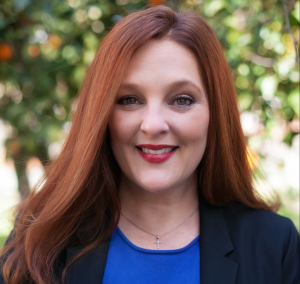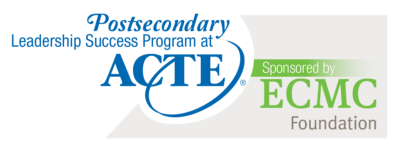 Meet Rebecca Farley, dean of instruction at Bakersfield College. Her Techniques interview appears as part of a digital-exclusive spotlight series on fellows in the Postsecondary Leadership Success Program at ACTE – Sponsored by ECMC Foundation.
Meet Rebecca Farley, dean of instruction at Bakersfield College. Her Techniques interview appears as part of a digital-exclusive spotlight series on fellows in the Postsecondary Leadership Success Program at ACTE – Sponsored by ECMC Foundation.
What leadership skills did you develop as part of the Postsecondary Leadership Success Program at ACTE?
As a postsecondary fellow with ACTE, I have grown in my ability to develop a shared vision for career and technical education (CTE) work in my area. Further, I learned strategies for building a more welcoming and inclusive culture. I am grateful for the opportunity to have broadened my professional network and to have learned from experts who are positively impacting their communities.
In what ways have you innovated to engage students >amp; inspire colleagues in CTE through the COVID-19 pandemic?
Navigating the challenges of the COVID-19 pandemic has required nearly constant innovation. As we shifted to fully remote operations in March 2020, I launched a weekly Zoom check-in across our service area to ensure we maintained connections. The shift in meeting modality and broader inclusion of all partner schools yielded rich conversations about the challenges our students and faculty were facing. These discussions allowed us to generate potential solutions leveraging our collective resources. And we used this online space to build community. We celebrated successes, located technology resources, brainstormed ideas to increase engagement, and mourned the loss of one of our students together.
As we began the Summer 2020 term, senior agriculture science had completed their entire program of study except for two lab courses. We worked diligently to prepare hybrid versions of the final two courses, including complex lab rotations at the college farm. With creativity and collaboration, we pooled our resources and worked through numerous challenges to execute the classes our students needed. It was remarkable to watch the commitment of the faculty, staff, administration, and students intensify collectively to ensure the pandemic did not derail this cohort’s opportunity for degree completion.
- The high school provided transportation to ensure the distance was not a barrier.
- College faculty provided lab stations across every room at the farm to ensure social distancing guidelines were followed. And they volunteered their time to ensure students were supported.
- The college maintenance and operations team sanitized workspaces between rotations for student and faculty safety. The college faculty teamed up to ensure students were supported through the rotations.
Our education systems face many challenges in 2022. Please discuss the steps CTE can take to improve equitable access to high-quality CTE programs of study.
CTE programs are well positioned to help drive economic recovery. Administrators must leverage targeted collaboration with faculty, staff, and industry partners to identify needs and opportunities in the labor market. CTE leaders, consider how your programs might benefit from expanding industry advisory committees, meeting more frequently with them, and listening carefully.
Next, provide a variety of work-based learning experiences so that students may develop industry-validated skills and help increase their future marketability. Equally as important, CTE leaders must seek substantive input from students to clearly understand their challenges, aspirations, and perceptions of the programs and services provided. In close collaboration with students and industry leaders, CTE partners can help all students achieve career success.
Learn more about the Postsecondary CTE Fellowship.
Please also meet:
- Tiffanie Rosier, STEM education coordinator at Northern Virginia Community College
- Tachaka Hollins, assistant vice chancellor for academic affairs at the Tennessee Board of Regents
- Tracey D. Cooper, executive director of nursing at Temple College
- Bernie Phelps, director of Perkins, Perkins Rural Reserve and dual enrollment at Montana Technological University, Highlands College
- Vickie Thomas, director of the Center for Workforce and Community Development at Eastern New Mexico University – Roswell
- Moira Lafayette, dean of health sciences and public safety at Blackhawk Technical College
- Brad Kinsinger, director of the Global Agriculture Learning Center at Hawkeye Community College
- Eric Sewell, director of technical education at Southern Union State Community College
- C.J. Wurster, district director at Maricopa County Community College District
- Katie Vincent, director of workforce partnerships at Owensboro Community and Technical College
- Dr. Xue Xing, assistant professor of teaching and learning at University of Nevada – Las Vegas
- Aleksander Marthinussen, program manager with NOVA SySTEMic at Northern Virginia Community College
- Dan Adams, former CTE administrator and current stay-at-home dad
- Ashlee Spannagel, dean of CTE and workforce development at Southeastern Community College
- Darlene O’Rourke, Perkins grant director and officer at Queensborough Community College
- Shelsi Barber-Carter, CTE coordinator at Baton Rouge Community College







